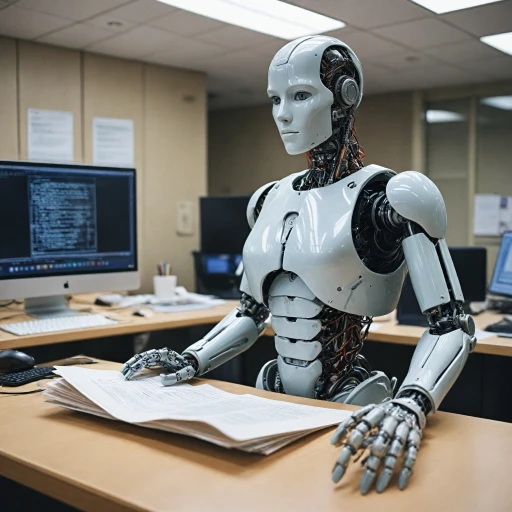
Understanding Genetic AI
Delving into Genetic Algorithms in AI
Artificial Intelligence (AI) has been making significant strides in transforming various industries, with Human Resources being a prime focus. Among the diverse AI methodologies, genetic algorithms stand out for their unique approach to solving complex tasks in HR. These algorithms emulate the process of natural selection, thereby optimizing business processes and decision making. When applied to HR, they bring transformative changes by enhancing efficiency in recruitment, employee engagement, and workforce management. Genetic algorithms are particularly beneficial because they enable systems to operate autonomously within set parameters. This autonomous function allows AI to adapt to new data in real time, making dynamic decision making a reality. It is no longer just theoretical—it is practical and being implemented in numerous businesses. This advancement provides a robust framework for data analysis and real-time workflows engine optimization. Incorporating genetic algorithms into HR systems allows for the efficient handling of huge datasets, fostering better data collection and analysis. By doing so, these systems offer significant insights into employee and customer reports, improving compliance and governance across various company workflows. Additionally, the use of low code and agent builders helps create more adaptive HR solutions, addressing complex tasks with ease. While AI-driven HR holds immense potential, companies must acknowledge ethical considerations and governance issues. It is crucial to maintain human oversight to balance the tech’s power with ethical business processes. Nevertheless, when done correctly, the implementation of genetic AI in HR can drive businesses to build smarter, more efficient, and more compliant systems. To delve deeper into the transformative impact of AI in human resources, you can refer to how AI is transforming HR here.Revolutionizing Recruitment Processes
Transforming Hiring Strategies with AI
The recruitment landscape is being revolutionized by artificial intelligence driven technologies. Genetic AI is a powerful tool aiding businesses to seamlessly connect with potential candidates by automating complex tasks within the recruitment process. This tool effectively sifts through large datasets to identify the most suitable candidates while considering key qualities sought after by employers.
Traditional recruiting methods often lead to time-consuming processes. However, with agentic systems in place, companies can now focus on a low code strategy that allows for agile and flexible hiring operations. AI enables businesses to build more efficient workflows, reducing the time spent on initial candidate screening.
Genetic AI employs data analysis to deliver insights that refine decision-making processes, identifying candidates that align with the company’s values and needs. The capacity of agent builders to integrate not just with recruitment systems but also with business processes helps in optimizing workflows for better synchronization and results.
Addressing the need for greater diversity and compliance, AI also facilitates better risk management. The technology integrates vacation and workflows engine compliance checks, ensuring that candidates meet necessary legal and organizational standards. Furthermore, data privacy remains a key focus, requiring robust security measures to protect sensitive information as it traverses administrative and technological layers.
Incorporating AI in recruitment allows for a real-time response to customer and business needs, leveraging knowledge graphs to outline potential cultural fits and strategic hires. This bridges gaps in traditional hiring strategies, making recruitment more transparent and effective.
Enhancing Employee Engagement
Fostering Meaningful Employee Connections with AI
In the realm of human resources, enhancing employee engagement is pivotal for nurturing a thriving workplace. Recent advancements in artificial intelligence have unlocked pathways to deeper investment and participation from employees. The integration of generative AI and autonomous agents has propelled real-time engagement strategies, making it possible for businesses to personalize experiences and address employee needs promptly. AI-powered agents assist organizations in optimizing processes by analyzing data collected via employee feedback and workflow systems. This allows companies to tailor their engagement initiatives, making them more attuned to unique employee needs and fostering agentic connections within the workforce. By leveraging technology such as knowledge graphs and real-time data analysis, firms can navigate complex tasks with greater precision, ensuring that employee journeys are seamless and satisfying. Notably, the ability to gauge engagement in a dynamic manner is bolstered by AI's generative capabilities. This means that rather than relying solely on static data reports, HR professionals can adopt low-code solutions and workflows engines that enable them to proactively adapt to shifting employee dynamics, ultimately enhancing how they cultivate an engaged and motivated team. Moreover, with increased scrutiny on data privacy and compliance, businesses need to ensure that AI systems operate within stringent governance frameworks. This dual focus on ethical governance and human oversight is crucial in maintaining trust and credibility while implementing AI-driven engagement solutions. In doing so, organizations can confidently build systems that not only support the human aspect of their workforce but also comply with industry standards. To further delve into the implications of AI in fostering employee engagement and other HR processes, see termination vs resignation in the age of AI, exploring nuanced perspectives on how human resources can evolve in an AI-driven world.Optimizing Workforce Management
Workforce Optimization through Genetic AI
The integration of genetic AI into workforce management systems offers unprecedented opportunities for optimization. Organizations increasingly rely on data analysis to fine-tune their business processes. This involves crafting workflows that align with real-time business needs, ensuring agentic and compliance-driven solutions are effectively deployed. Genetic AI enables the creation of autonomous agents capable of managing complex tasks with a degree of human oversight. Its ability to process large datasets means businesses can leverage knowledge graphs and data collection techniques to enhance decision-making processes. This technology isn't just another cog in the machine; it's a substantial component of a digital transformation strategy focused on efficiency. Moreover, adapting genetic models in workforce planning involves risk management strategies to address ethical and data privacy concerns. Companies can ensure that their governance policies remain transparent and accountable while utilizing AI's potential. Businesses build strategies that incorporate agent builders and low-code technologies, which serve as a bridge between traditional HR management and cutting-edge solutions. Real-time data allows companies to rapidly adapt to changes and make informed decisions. For instance, a workflow engine based on genetic algorithms can fine-tune customer service operations, ensuring human agents are utilized optimally. This reduces bottlenecks and enhances employee satisfaction and productivity—making it a pivotal component in modern HR workflows. In this way, genetic AI empowers organizations to not only maintain but evolve their workforce, aligning talent management strategies with the future of work. By prioritizing efficiency and human-centric approaches, businesses can balance the demands of innovation and ethical standards in workforce management.Addressing Ethical Considerations
Balancing Innovation with Responsibility
As businesses build advanced systems with genetic AI, addressing ethical considerations becomes crucial. The integration of artificial intelligence in human resources, particularly through autonomous agents and real-time decision-making, presents both opportunities and challenges. Ensuring compliance with data privacy regulations is paramount. Companies must establish robust governance frameworks to manage data collection and analysis responsibly.
One of the primary concerns is the potential for bias in AI-driven processes. While AI can enhance decision-making, it is essential to maintain human oversight to prevent discriminatory practices. This involves regular audits and transparent reporting mechanisms to ensure that AI systems operate fairly and equitably.
Ensuring Ethical AI Deployment
To mitigate risks, businesses should adopt a proactive approach to risk management. This includes developing workflows that incorporate ethical guidelines and compliance standards. By leveraging low-code platforms and agent builders, companies can create AI solutions that align with their values and business objectives.
Moreover, the role of AI in customer service and employee engagement must be carefully managed. AI agents should be designed to complement human interactions, not replace them. This balance ensures that technology enhances, rather than detracts from, the human experience in the workplace.
Ultimately, the successful integration of genetic AI in HR hinges on a commitment to ethical practices and continuous improvement. By fostering a culture of transparency and accountability, organizations can harness the full potential of AI while safeguarding the interests of their employees and customers.













